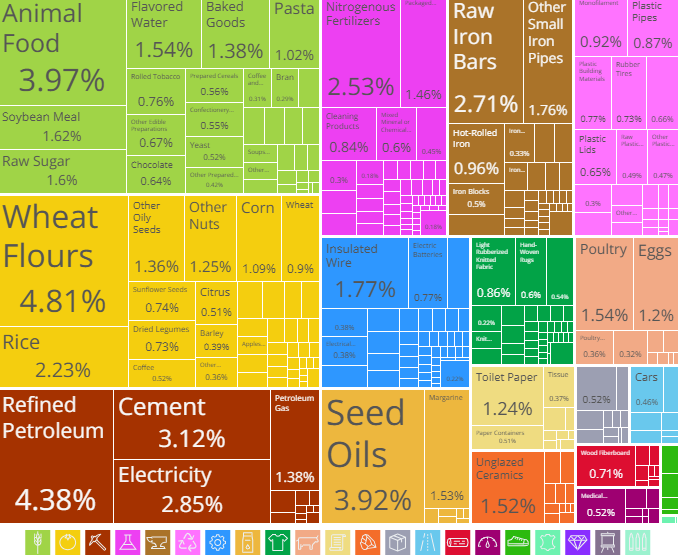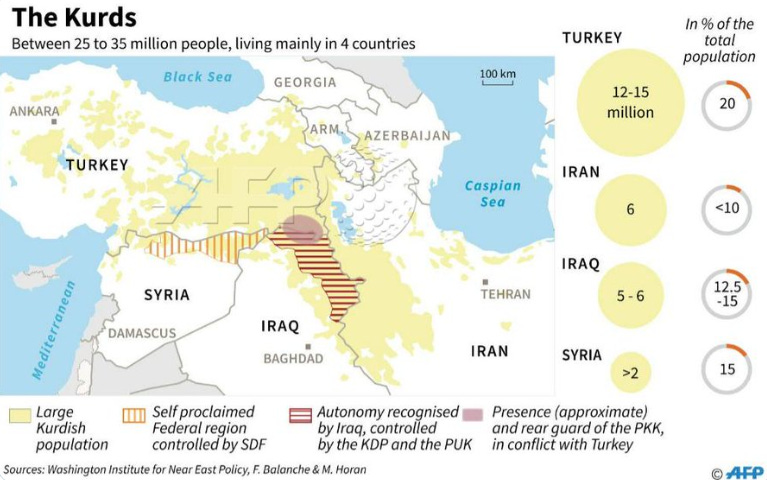Turkish manufacturers of cement, building materials and machinery equipment have expanded their exports to neighboring Syria after the fall of Bashar al-Assad's regime as part of Ankara's broader push to expand its influence into the Arab country.
Turkey exported $67.6 million worth of goods to Syria in January, marking a 34% year-on-year increase, according to the Southeast Anatolian Exporters' Association. Turkish exports to Syria rose an annual 20% in December when forces loyal to Ahmed al-Sharaa, who is now the country's transitional president, toppled Assad.
A nearly 14-year-long civil war has decimated Syria. The economy contracted by roughly 85% as anti-Assad forces tried to topple the regime from 2011 as part of the Arab Spring protests. Reconstruction costs in Syria were estimated at between $250 billion- $400 billion.
"There is talk of a $400 billion cake for the reconstruction of Syria," Serdar Ayirtman, chief executive of the Catoni Group, a collection of logistics companies, said. Syria will require "infrastructure investments, power plants, other major construction and project transportation," he said.

Turkey is "the key hub for the transportation of goods" for Syria," Ayirtman added.
Turkish President Recep Tayyip Erdogan has pushed to expand ties with Syria's al-Sharaa. The two leaders met in Ankara on February 4 to discuss “training of the new Syrian army, as well as new areas of deployment and cooperation," an official in Syria's transitional government told Reuters.
Representatives from Erdogan's office said "possible joint measures to rebuild the country's economy" were on the agenda.
Turkish Companies Expect Syrian Trade to Surge
With massive Syrian reconstruction on the horizon, Turkish companies see bilateral trade surging from $2.2 billion last year.
Forwarding and Logistics Association President Bilgehan Engin told Reuters that trade could reach over $6 billion within 2-5 years. The head of the Turkey-Syria Business Council, Fuat Ozcorekci, puts the medium-term goal at $10 billion.
Cement manufacturers Oyak Cimento (OYAK.IS), Limak Dogu Anadolu Cimento (LMKDC.IS), and Akcansa (AKCNS.IS), and Turkish steel producers such as Isdemir (ISDMR.IS) are expanding into Syria. In January, Turkish machinery exports rose 244%, with cement, glass and ceramics increasing 92%, and metal up 73%.
Ahmet Oksuz, chairman of the Istanbul Textile and Raw Materials Exporters' Association, has advocated for a special production zone on the Turkish-Syrian border. Oksuz said that this would help lower production costs and offer employment and repatriation opportunities for Syrian migrants.
Turkish construction-related stocks, led by cement and steelmakers, rose, with investors betting the companies will play a key role in the reconstruction.

"Our industry can efficiently adapt to the new situation on the ground," is the statement of Fatih Yucelik, head of the cement industry association Turkcimento. Member companies are more than able to help the reconstruction effort in Syria once the dust there settles, he added.
Turkey's Syrian Push Raises Concerns
Turkish companies push into Syria, though, may face geopolitical challenges. The Syrian war remains far from settled, terrorist organizations and militias remain powerful, and geopolitical differences persist.
Analysts warn that Ankara may use the deepening of Turkish-Syrian ties to assert itself as the new dominant influence in Syria.
Turkey has controlled various enclaves along the Turkish-Syrian border and supported militias battling the Assad government. Ankara supports the 90,000 fighters with the Syrian National Army (SNA), an active combatant during the Syrian civil war.
The recent discussions of greater military cooperation "highlight Turkey's growing influence in Syria, surpassing Iran and Russia as the dominant foreign actor," Ahmad Sharawi, Research Analyst for the Foundation for the Defense of Democracies (FDD) based in Washington, said.
Syria is a strategic asset for Ankara in its efforts to weaken the Kurdish-led Syrian Democratic Forces, Sharawi said. Erdogan wants to establish a strong military partnership with the new Syrian state to bring "it closer to that goal," he said.

Erdogan's Moves Raise Geopolitical Competition
Before the collapse of Assad, Iran played a major role in propping up the former regime. Now, Saudi Arabia has tried to position itself as an alternative to both Iran and Turkey.
Riyadh has offered to cut Iran out as Syria's principal oil supplier and help bankroll the war-torn nation's reconstruction.
Al-Sharaa met with Saudi Crown Prince Mohammed bin Salman in Riyadh on February 2. They discussed “extensive future plans in the fields of energy, technology, education, and health."
However, al-Sharaa's subsequent discussions with Erdogan reinforced fears of increased Turkish military influence.
Multiple Syrian intelligence officials told Reuters they discussed military accords between the two nations. These officials, who spoke on the condition of anonymity, said these first-of-their-kind agreements would include two Turkish air bases located in Syria's Badiyah desert region.
"Turkey's leaders now seek to shape Syria's future governance, not just in terms of stability but also in molding a system that reflects its own political ethos," Asli Aydintasbas, Associate Senior Policy Fellow at the European Council on Foreign Relations, wrote. Erdogan has already offered to help al-Sharaa draft a new constitution.
Assad Ousting Risks Rise of Islamist Government
Concerns about Syria's future are compounded by al-Sharaa’s ties with al-Qaeda. While the US recently removed a $10 million bounty on al-Sharaa, Hayat Tahrir al-Sham (HTS) is still designated a terrorist organization by the UN, EU, and US.
HTS only cut ties with the terrorist organization responsible for the attacks on September 11, 2001, five years ago. It did so to "moderate."
Erdogan's past links to the Muslim Brotherhood and increasingly pro-Islamist stance have amplified unease over Ankara's role in Syria.
"Turkey has laid the foundation of a post-Assad Syria that will be governed by a jihadist entity," FDD Non-Resident Senior Fellow, Sinan Ciddi, wrote. "Erdogan intends to nurture this regime and become its main patron."
Disclaimer:
Any opinions expressed in this article are not to be considered investment advice and are solely those of the authors. European Capital Insights is not responsible for any financial decisions made based on the contents of this article. Readers may use this article for information and educational purposes only.
This article is from an unpaid external contributor. It does not represent Benzinga’s reporting and has not been edited for content or accuracy.
© 2025 Benzinga.com. Benzinga does not provide investment advice. All rights reserved.
Trade confidently with insights and alerts from analyst ratings, free reports and breaking news that affects the stocks you care about.